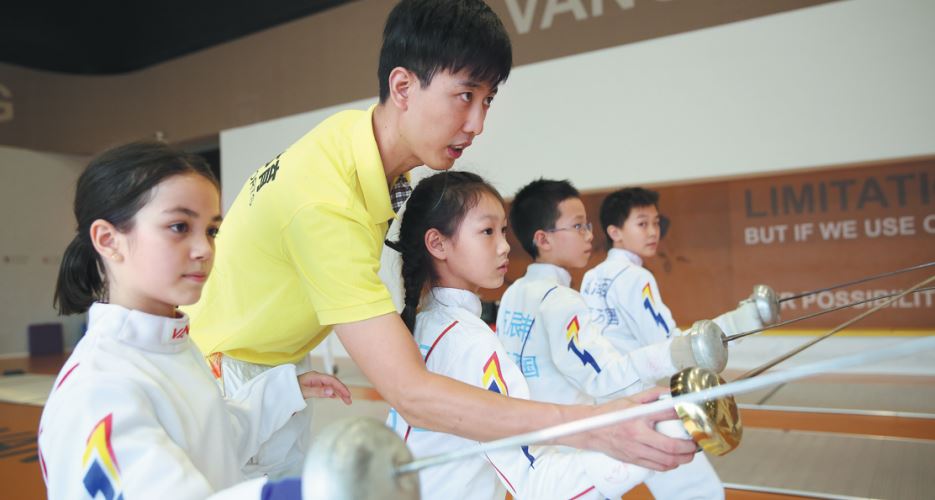On guard for glory
 0 Comment(s)
0 Comment(s) Print
Print E-mail China Daily, February 18, 2019
E-mail China Daily, February 18, 2019

Yang Peilin first picked up fencing in 2016 after his friend recommended that he try the sport. He liked it so much that he decided to let his 11-year-old son, Yang Junran, follow suit.
As it turned out, the boy had a natural flair for swordsmanship. He even went on to win several prizes in competitions.
"We had no idea about the sport when we first started as no one we knew did fencing. As we got to learn more about it over time, my son started to develop a keen interest in it, and the sport has in turn helped him to improve his physical and mental wellbeing," Yang Peilin said.
The fencing classes his son attends consist of physical fitness lessons with other students as well as private one-on-one sessions, some of which are conducted by former national fencers. Yang occasionally sends his son abroad to take part in training sessions during the summer and winter vacations.
Yang said he spends between 60,000($8,815) and 100,000 yuan a year on his son's fencing endeavors which include training fees, equipment and travel costs.
"Fencing has broadened my horizons. Competitive action has also trained me to better overcome difficulties in life," said Yang Junran, who takes part in about 30 competitions every year.
Fencing boasts a rich Olympic history, dating to the first modern Games in Athens in 1896. However, it wasn't until 1955 that the sport took root in China after a Soviet athlete started a course at Beijing Sport University.
Luan Jujie won China's first fencing Olympic gold medal at the 1984 Los Angeles Games, but recent performances on the global stage have left much to be desired.
At the 2016 Olympics in Rio de Janeiro, China took home only one silver and one bronze, while a solitary bronze was all that could be managed at the 2018 world championships in Wuxi, Jiangsu province.
However, hopes are high that rising participation will eventually translate to more medals.
The Chinese Fencing Association says its membership totaled around 34,000 in 2018, an increase of 28 percent from the previous year. Nationwide, there were about 300,000 amateur fencers.
The number of registered fencing organizations in the country last year stood at 639, a 60 percent increase over 2017.
Vango Sports is one such club, boasting 18 training centers across the country and a membership of 150,000.
"There were only 200 to 300 amateur fencers in China 12 years ago when the club was established then. Today, thousands of students from primary schools participate in fencing competitions," said Vango's CEO, Zhang Tao.
"About 80 percent of our members are under 18 years old. I believe that when they grow up, the national fencing industry will be totally different from what it is today."
Zhang attributes fencing's growing popularity to a number of factors, including the national fitness boom, the growing role of sports in education and strong governmental support.
"Fencing is more than just about fitness. It is a sport that teaches one about etiquette and important skills that can be applied to life," said Zhang.
Specifically in China's case, fencing can also be applied to the college application process. The sport's inclusion in the national unified examination in 2018 means students can earn extra points for enrolling in colleges.
Liu Feng, deputy director of the Anting Town Culture and Sports Center in Shanghai's Jiading district, said many colleges are now conducting independent recruitment drives for fencers.
"In recent years, some colleges have started offering fencing courses and special enrolment for sports. Tsinghua University and Peking University have been taking in excellent fencers," he said.
The sports bureau in Shanghai has taken a similar path, holding various fencing competitions to attract young people. Some schools in Jiading district have even hired professional fencing coaches.
"Shanghai has paid a lot of attention to fencing. According to official records, there are 50 youth fencing clubs in the city and enrollment has been increasing. Each district has introduced measures to support the growth of fencing," said Liu.
Tang Xiaohui, whose 13-year-old son started fencing more than a year ago, is another member of the sport's growing fan club.
"Several years ago there was no club like Vango, which has large and professional venues, flexible courses and professional coaches. Such places make the learning process much more convenient," he said.
Fencing has become a victim of its own success, however, with the sport struggling to meet the demand for coaches and referees, according to the chairman of the Chinese Fencing Association, Wang Haibin. Training new professionals is, therefore, a priority.
There are also concerns over how amateurs transition to the professional ranks. To make the process smoother, Wang has proposed improving the quality of training, cracking down on violations of competition discipline and strengthening standardization measures.
Despite these concerns, China, as in so many sports, has size on its side.
Michel Dessurealut, executive coach of Vango Sports in Shanghai, points out that the number of members in his club alone exceeds Canada's total population of fencers.
"To find a great athlete is easy while to find one who also wants to win and accepts training is always hard in every country. Luckily, though, China has a big pond to choose from," Michel said.






Go to Forum >>0 Comment(s)